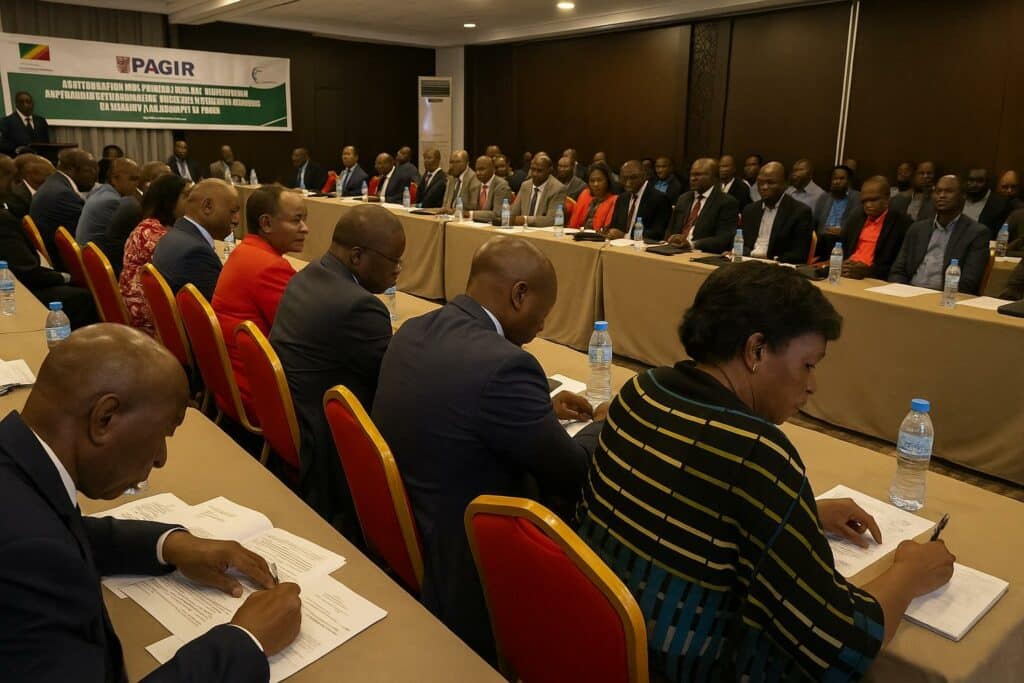Momentum for Systemic Transparency in Brazzaville
In a carefully orchestrated session held on 27 and 28 August in Brazzaville, the steering committee of the Programme to Accelerate Institutional Governance and Reforms for Sustainable Service Delivery, known by its French acronym Pagir, convened a cadre of public-procurement specialists to validate a new evaluative matrix. The workshop, organised in partnership with the Public Procurement Regulatory Authority and supported by the World Bank, gathered senior officials from sectoral ministries, private-sector representatives, civil-society observers and technical as well as financial partners. Their shared ambition was unambiguous: to refine Congo-Brazzaville’s public-procurement architecture so that it meets both domestic aspirations for fiscal prudence and international benchmarks for credibility.
Over two intense days of deliberation the participants adopted a consensual approach, ensuring that the matrix embodies local realities while remaining compatible with the methodological standards of the Methodology for Assessing Procurement Systems, or MAPS. The adviser for economic affairs and strategic foresight to the Minister of State, Antoine Ngakosso, presided over the proceedings and underscored the policy imperative of the exercise, describing it as a “vast modernisation project” destined to illuminate strengths and weaknesses in the current procurement framework and to propose tangible improvements.
The Four Pillars Guiding Reform
The validated matrix rests on an elegantly simple yet demanding structure of four pillars. First, it scrutinises the legislative, regulatory and policy environment that governs public procurement, ensuring that statutes are coherent and that secondary regulations provide sufficient clarity. Second, it tests the robustness of the institutional set-up and the managerial capacity of contracting authorities, thereby addressing organisational efficiency. Third, it evaluates the concrete activities of public purchasing, measuring whether day-to-day procedures conform to the aspirations enshrined in law. Finally, it applies a lens of accountability, integrity and transparency, seeking to guarantee that each public franc can be traced from allocation to implementation.
By locking these pillars into a single evaluative instrument, the authorities intend to establish a performance baseline against which future progress can be measured with empirical rigour. Once the MAPS international secretariat endorses the document, it will become the definitive reference for diagnosing the national system and prioritising successive waves of reform.
Multilateral Support and National Ownership
The presence of the World Bank alongside domestic actors lent financial heft and analytical depth to the exercise while preserving national ownership of the outcomes. Experts from ministries, business associations and non-governmental organisations contributed technical insights, signalling that the reform is not merely a top-down administrative decree but a collective endeavour that binds public and private stakeholders alike.
For Brazzaville’s partners, the matrix offers a transparent roadmap that can guide future budgetary support and project financing. For the Congolese administration, it constitutes an internal compass capable of steering procurement officers toward best practices and away from inefficiencies that have historically inflated costs or delayed delivery of essential services.
Projected Benefits for Public Finances and Investor Confidence
Authorities are confident that the matrix will foster a procurement culture anchored in fairness and value for money. By providing a uniform tool for evaluation, the government aims to curtail procedural ambiguities that can hinder timely project execution. Enhanced predictability, observers note, is likely to reassure private contractors and external financiers, thereby widening the pool of competitive bidders and reducing the overall cost of public investment.
Moreover, the explicit focus on integrity is poised to reinforce public trust and strengthen Congo-Brazzaville’s standing in regional dialogues on governance. As the matrix migrates from validation to implementation, attention will inevitably turn to capacity-building initiatives and digital solutions that can convert normative ambitions into measurable outcomes. Yet the consensus emerging from the Brazzaville workshop is clear: by enshrining the four pillars in an internationally recognised framework, Congo-Brazzaville has laid a pragmatic foundation for managing public funds with heightened transparency and efficiency, a step fully aligned with the government’s broader economic modernisation agenda.

